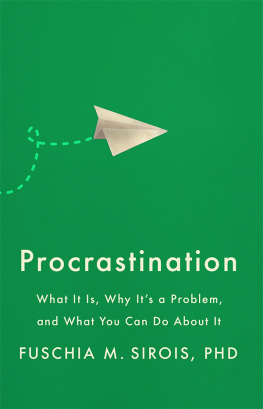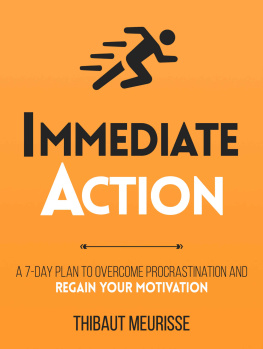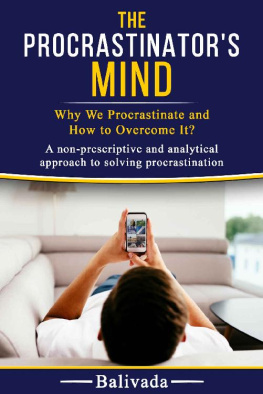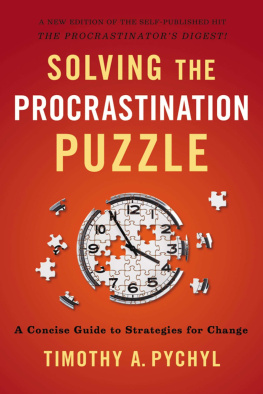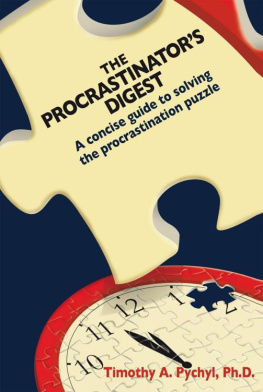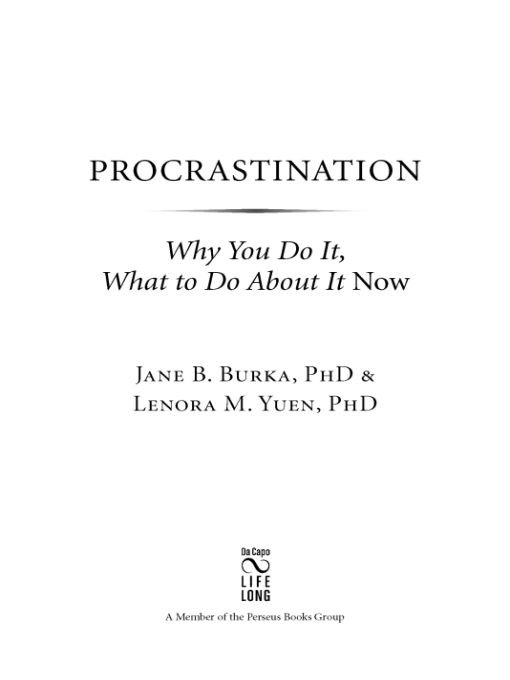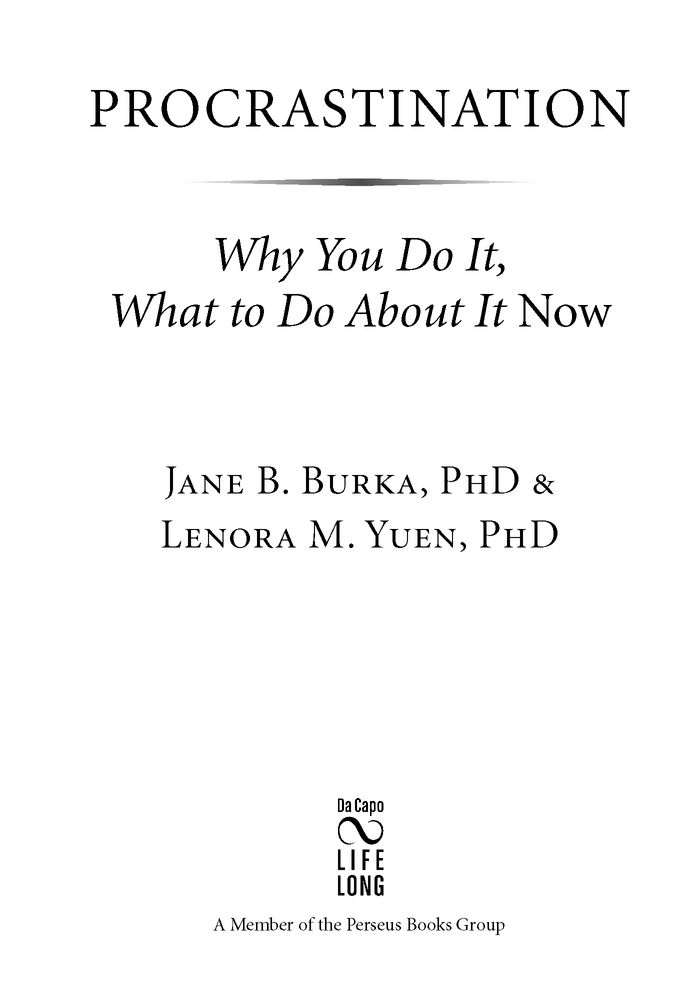Table of Contents
Praise for PROCRASTINATION
Trying to kick the procrastination habit? In their practice treating procrastinators, [these] California psychologists... have pinpointed several causes.
USA Today
An exploration of what causes people to procrastinate and various procrastination styles.... Fascinating.
Fitness
Dr. Burka and Dr. Yuen... get procrastinators to feel better about themselves.... In learning to reduce their delaying tactics, procrastinators have much to gain in addition to faster performance and enjoying life more.
New York Times
Procrastination can be deadly to just about every aspect of your life... Burka and Yuen... offer hope for those prone to delay.
Boston Herald
Procrastinations basic message: A tendency to be tardy is neither a bad habit nor moral failing [but] a complex psychological problem caused by fear.
U.S. News and World Report
Warmly and even humorously written, but the points are clearly made.... Burka and Yuen did not procrastinate in getting to the remedies which have been successful in their clinical work.
Honolulu Star-Bulletin
Burka and Yuen see procrastination as more than just laziness. For some, its closer to a psychological block that keeps them from doing what needs to be done.
San Jose Mercury-News
If procrastination is starting to play havoc with your sanity... fortunately there are... helpful tools [in] Procrastination.
Oakland Tribune
A close examination of procrastination.... Most useful is the authors advice on how procrastinators can break their bad habits.... This frequently lively book will certainly set time-wasters and task-avoiders on the path to self-improvement.
Publishers Weekly
A good overview.... The authors provide useful suggestions without being slick... [and] give sensible advice for dealing with the procrastinators in ones own life.
Library Journal
Why do we make excuses and put things off? Jane Burka and Lenora Yuen explain how we get that way, and what we can do to stop it.
In Business
Want to stop procrastinating and be more productive? Read this now!
Working Woman
Acknowledgments
We are grateful to all the people in our private practices and our Procrastination Groups and Workshops for deepening our understanding of procrastination. Hearing their stories, understanding their struggles, and helping them progress has been one of the great joys of our professional life. Their words, phrases, and stories have significantly enriched this book.
We appreciate the support and encouragement of the many friends and colleagues who helped make this book possible. Carol Morrison offered wise editorial advice as well as frequent personal boosts. Ken Rice graciously shared his extensive research on perfectionism. Barbara Blasdel, Karen Peoples, and Leslye Russell are members of a writers group that provided psychological guidance and inspiration along with editorial eyes and contact creativity. Apologies to the many friends who remained supportive even while being neglected. Barbara Kaplan, Gerson Schreiber, Ingrid Tauber, Kathy De-Witt, Virginia Fredrick, Beth Herb, Anna Muelling, and members of the Lindemann Study Group and the Stanford Professional Womens Book Club offered steady encouragement with open hearts and great patience for many canceled meetings. Our dear friend Taraneh Razavi opened not only her heart to us, but her wonderful beach house where we spent many weekends working with a magnificent view of the Pacific Ocean. Taraneh, we dont know how we would have done it without your generosity.
The editorial staff at Da Capo Press provided both leadership and responsiveness. Our editor, Jonathan Crowe, has been unfailingly gracious and supportive of this project; his kind and respectful guidance was a pleasure. Renee Caputo is just what we would want a production manager to be: clear, efficient, and on time. Jennifer Swearingon is a wonderful copyeditor, and that means a lot coming from two recovering perfectionists, one of whom had an English-teacher mother.
Immense love and gratitude to Paul and Reece for each being that special combination of family and friend. You were steadying influences when necessary and always generous well-wishers. And to John, Nick, Chloe, and Obithank you for your patience, your tolerance, your editorial suggestions, and for being the best family ever. It is a privilege to share the planet with you.
Finally, in the first edition of this book, we had to acknowledge our indebtedness to Federal Express, which enabled us to meet numerous deadlines at the last minute. This time we thank all who made the Internet accessible to the technologically challenged and those who developed the Track Changes editing program for manuscripts. What a difference twenty-five years makes!
A Note to Our Readers
People who write books are supposed to be very knowledgeable about their subjects. We know procrastination from the inside out: between us, we have been through many all-nighters, spent long years struggling with our doctoral dissertations, paid late tax penalties, and made up elaborate scenarios to excuse our delays (a story about a death in the family is our most extreme example).
In addition to two lifetimes of personal experience, we have had many years of professional experience working with procrastinators. We began in 1979 when we were on the staff of the Counseling Center at the University of California at Berkeley where, to the best of our knowledge, we created the first group treatment program for student procrastinators. In our Procrastination Groups, we saw patterns and themes emerge again and again. While each individuals struggle was unique, there were many striking similarities among them. We learned, for example, that our plan to start the week off by holding the group on Monday mornings from nine to eleven was completely unrealisticno one even showed up until ten oclock!
When we offered Procrastination Workshops to the general public, we were once again reminded of the nature of the beast. We almost canceled our first workshop one week before the scheduled date because too few people had registered. In the end, we had to move to a larger room when two-thirds of the group signed up at the last minute.
For thirty years now, we have worked with individuals in our private practices of psychotherapy and psychoanalysis, exploring issues of procrastination in depth for extended periods of time. Our patients have opened their hearts and minds to us, and we have been the fortunate beneficiaries of their courage.
All of these experiences have reinforced our idea that procrastination is not primarily a time management problem or a moral failing but a complex psychological issue. At its core, problem procrastination is a problem with ones relationship to oneself, reflecting a shaky sense of self-esteem. In our first book, we called it a problem of self-worth. Now we emphasize that self-worth is rooted in the capacity for acceptance, which includes acceptance of our biology, our history, our circumstances, and our many human limits.
Why, after twenty-five years, did we decide that the time is right for an update of our book? We want to place procrastination in the context of our current culture and add new perspectives to our formulation of what procrastination is all about. In addition to having a deeper psychological understanding of the issues, we have new information from other fields, such as neuroscience and behavioral economics, that contributes to the understanding of procrastination.


